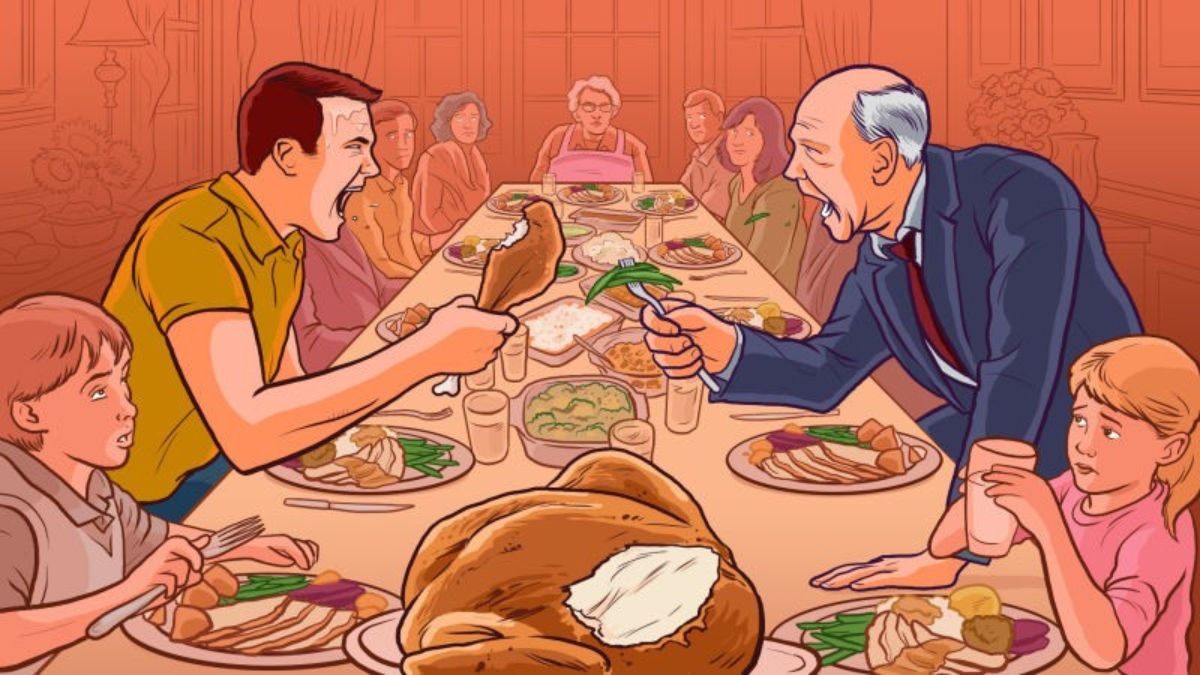The re-election of Donald Trump has created ripple effects across American households. Thanksgiving, traditionally a time of unity, has instead highlighted deep-seated tensions as families grapple with stark ideological differences.
From cancelled gatherings to emotional boycotts, this year’s holiday landscape paints a picture of a nation struggling to reconcile its political divides.
For some, Thanksgiving is no longer about turkey and togetherness.
Jeff, a 59-year-old real estate agent in Washington, has found himself ostracised from his family due to both his sexuality and his opposition to Trump. “They don’t want to speak with us,” Jeff shared with AFP, referring to himself and his husband.
His brother, a staunch MAGA supporter, has not spoken to him for five years, believing, in Jeff’s words, “gay people should be sentenced to death.”
Similar stories are emerging nationwide. Ana, a 31-year-old from Philadelphia, opted out of her family’s Thanksgiving dinner, citing her uncles’ unwavering support for Trump. “I don’t want to see my cousins being raised this way,” she told AFP, admitting she lied about being sick to avoid the event.
Instead, she planned a quiet celebration with friends in New York, reflecting that the holiday came “too soon after the election.”
Psychology expert Laurie Kramer highlights that such political divides strain family bonds. “We have to accept that everyone is different and find ways to preserve important relationships,” she tells AFP.
Are holiday boycotts becoming a form of protest?
For others, skipping Thanksgiving is a deliberate act of resistance. Andrea Tate, in a viral essay in HuffPost, explained why she cancelled both Thanksgiving and Christmas after discovering her husband voted for Trump while she supported Kamala Harris.
Upon seeing his celebratory social media post, she texted him: “Tell your family I love them, but I will not be coming for Thanksgiving, and I won’t be hosting Christmas. I need space.”
Also Read | What is ‘MATGA’ movement, where US women are suggesting poisoning men?
While her husband apologised, Tate maintained minimal contact. She noted, “Somewhere inside, he must understand what this election outcome means to me. I will hold onto this like a life raft as I figure out how we move forward with our marriage.”
Similarly, Anna Gantt, a 26-year-old mother, took to TikTok to share her decision to boycott family holidays with Trump-supporting relatives. “It’s not the fact that they are Republicans; it’s the fact that they voted for Donald Trump knowing who he is and what he is capable of,” she said, adding, “I’m mourning the fact that my family is educated white people, and they still voted for him.”
What do the numbers tell us?
A CBS News poll revealed that 71 per cent of Americans plan to avoid discussing politics during Thanksgiving, pointing out the widespread discomfort surrounding political conversations.
However, some gatherings may be more politically homogenous. Many Harris voters report spending the holiday with like-minded individuals, while Trump supporters are doing the same, allowing for less contentious discussions.
Despite this, only 10 per cent of Americans have explicitly changed plans to avoid those who voted for a different presidential candidate. Gratitude for family and friends remains a common thread, cited as a top reason for thankfulness across all demographics, even as politics rank at the bottom of Americans’ concerns this holiday season.
Why is Trump’s re-election a concern for women?
Trump’s re-election has heightened anxieties among women, with 53 per cent voting for Harris compared to 45 per cent for Trump, according to CNN exit polls. Concerns about abortion rights and women’s health have driven some to boycott family gatherings altogether.
Online misogyny has also surged, with mentions of “your body, my choice” increasing by an astonishing 5,150 per cent in the days following the election.
The backlash has spurred movements like 4B , where women abstain from relationships with men and protest in other symbolic ways, including shaving their heads.
While the nation grapples with these divides, experts urge Americans to focus on understanding and compromise. As Kramer noted, “In our society, we all think that family should be joyous, but when that is not the case, people feel depressed, alone, isolated.”
Also Watch:
For some families, this Thanksgiving may serve as a somber reminder of political divisions. For others, it is an opportunity to find common ground.
With inputs from agencies
)